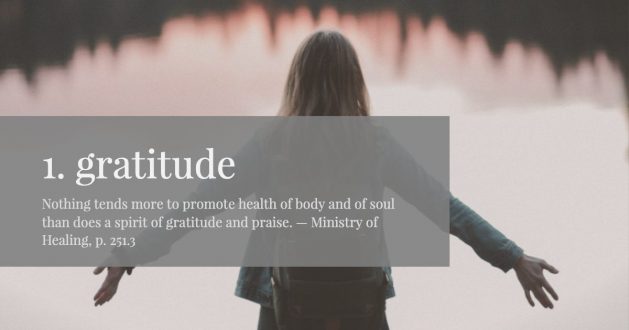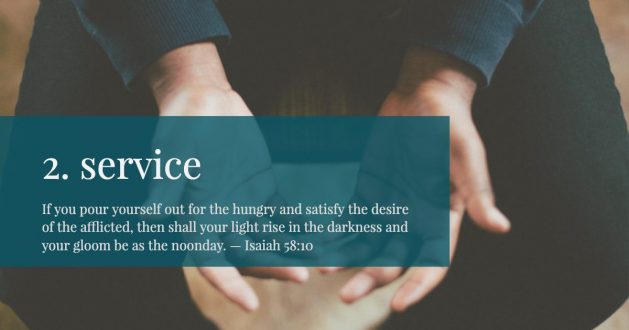
Do you struggle with negative thinking? Growing up, I was naturally pessimistic and sarcastic. I brought out the negative things in life, even in jokes. There were times, especially in high school, when I let my situation affect my thoughts. I was not a happy Christian solely because my thoughts would not allow me to be. If someone would say something about me that I didn't like, I would keep dwelling on it until I started to believe it.
In recent years, though, I have learned about how changing negative thinking can have a positive impact on our lives. If we don’t pay attention to our thoughts and how they are affecting us, our thoughts and feelings take over our lives and we start believing a lie instead of the truth.
Check out the following quote:
“
It is a positive duty to resist melancholy, discontented thoughts and feelings—as much a duty as it is to pray. If we are heaven-bound, how can we go as a band of mourners, groaning and complaining all along the way to our Father’s house? Those professed Christians who are constantly complaining, and who seem to think cheerfulness and happiness a sin, have not genuine religion. Those who take a mournful pleasure in all that is melancholy in the natural world, who choose to look upon dead leaves rather than to gather the beautiful living flowers, who see no beauty in grand mountain heights and in valleys clothed with living green, who close their senses to the joyful voice which speaks to them in nature, and which is sweet and musical to the listening ear—these are not in Christ. They are gathering to themselves gloom and darkness, when they might have brightness, even the Sun of Righteousness arising in their hearts with healing in His beams.
The Ministry of Healing, p. 251
So how can we take hold of this “genuine religion” for ourselves?


One study by a couple of American researchers assigned young adults to keep a daily journal of things they were grateful for (Emmons and McCullough, 2003). They assigned other groups to journal about things that annoyed them or reasons why they were better off than others. The young adults assigned to keep gratitude journals showed greater increases in determination, attention, enthusiasm and energy compared to the other groups. While that shows a clear benefit of gratitude, it also makes a clear distinction. Realizing that other people are worse off than you is not gratitude. Gratitude requires an appreciation of the positive aspects of your situation. It is not a comparison. Sometimes noticing what other people don’t have may help you see what you can be grateful for, but you have to take that next step. You actually have to show appreciation for what you have for it to have an effect.
When we fight the urge to think negatively and instead think gratitude and praise, our brain chemistry actually changes. And the more we are thankful, we’ll become new people.
It is a law of nature that our thoughts and feelings are encouraged and strengthened as we give them utterance. While words express thoughts, it is also true that thoughts follow words. If we would give more expression to our faith, rejoice more in the blessings that we know we have,—the great mercy and love of God,—we should have more faith and greater joy. –The Ministry of Healing, p. 251
When someone dear to me got sick, I had to deal with a lot of negative thoughts, about God, about the person and about myself. It was a hard time, but that person was the one actually encouraging me to think of what good things God has done for me in the past, to dwell on those things.
“In everything give thanks: for this is the will of God in Christ Jesus concerning you.” 1 Thessalonians 5:18. This command is an assurance that even the things which appear to be against us will work for our good. God would not bid us be thankful for that which would do us harm. –The Ministry of Healing, p. 255

Good deeds are twice a blessing, benefiting both the giver and the receiver of the kindness. The consciousness of right-doing is one of the best medicines for diseased bodies and minds. When the mind is free and happy from a sense of duty well done and the satisfaction of giving happiness to others, the cheering, uplifting influence brings new life to the whole being. –The Ministry of Healing, p. 257
That’s why I like canvassing, because it challenges me to not think about myself, but to really set self aside and think of others. When I go out with the mindset of getting what I want, instead of giving what’s best for the community, I don’t like it. Serving self instead of others creates a perfect environment for negative thoughts and beliefs, which eventually affect our behavior.


A traveler came upon three men working. He asked the first man what he was doing, and the man said he was laying bricks. He asked the second man the same question, and he said he was putting up a wall. When he got to the third man and asked him what he was doing, he said he was building a cathedral. They were all doing the same thing. The first man had a job. The second man had a career. The third man had a calling. Do you look at what you do every day as a calling? It doesn’t necessarily have to be the job of your dreams, but can you see the big picture in your daily actions? Do you realize what a difference you are making?
In that same way, focus on having right thinking that is based on truth. They were all true, but one saw obligation and the other opportunity. It really does depend on how you think about things; you can either say, “I have to go to work today” or you can say, “I get to make a difference today.”
By beholding, we become changed. If you think and talk negative, you will become like negative Nancy, but if you think and talk of Jesus, you will become like Jesus. Do you want to be like Jesus?

